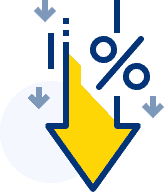Call Live Support


If that’s the case, this article is for you. Any type of borrowing action or loan that makes use of home equity as collateral is categorized under a home equity loan.
In this article, we will cover everything you need to know about these types of loans. As well as provide you with a useful home equity loan calculator, which will let you determine your home equity within several moments.
So whenever you’re ready to start your journey to home equity leveraging, keep reading.
In essence, home equity is the difference between how much you owe on a mortgage and the value of your home. For instance, if your house is worth $300,000 and you owe $200,000 on the mortgage, you will have $100,000 in total home equity.
Home equity is not defined permanently, and it can go up in several ways. For your home equity to go up, you either have to pay down your mortgage or increase the value of your home (which can happen automatically).
In Canada, this term is referencing all of the different loan types, which make use of a home as collateral for the loan. These are all home equity loans:
Second mortgages are taken out on the equity of the home, which stays on top of the already active mortgage. This type of loan allows a homeowner to borrow money without refinancing their mortgage. By using the house as collateral, you can acquire financiers to consolidate debts, make purchases, or finance projects.
Reverse mortgages are only available to senior citizens. This type of loan allows them to convert 55% of their equity into tax-free cash. These finances can be used for anything, including debt, renovations, and expenses.
A home equity line of credit or HELOC line uses your home to guarantee repayment on a loan. This type of loan can be issued for 65% of the market value of the home. The main advantage of this loan is that it allows you to borrow to your credit limit and pay off the loan on your own terms and conditions.
Refinancing your mortgage allows you to take a loan out to cover your current mortgage payments. This is usually done to reduce the higher interest rates. In general, a refinancing loan has its own terms, which can be separate from the lender or unique to the current mortgage.
Call us today to speak to a licenced mortgage broker.
Qualifying for a home equity loan is quite variable, but it’s mostly based on your available equity.
If you have good credit and a substantial income to qualify for access to equity, we can help you get better interest rates from the big 5. But if your credit is not that great and doesn’t have a verifiable substantial income, the equity can still be accessed based on the appraised value of the home.
Based on these factors, you will be able to acquire financing from a variety of lenders. Starting with the big 5 banks, and ending with private mortgage financing.
Knowing your credit score can help you determine which institutions or lending entities you can get your loan from. If your credit score ranges from 600-900, you will most likely be able to work with the major Canadian banks.
If you don’t fancy the big banks, you can work with smaller institutions that have less stringent qualification standards. These entities usually service individuals with scores between 550 and 700.
The most lenient qualification criteria are apparent with private individuals and corporations. If your credit is below 600, a private loan might be your best bet.
In many ways, the home equity loan borrowing capacity is dependent on the amount of equity you have and the true value of the home. In Canada, primary lenders will provide up to 80% of your home value in true loans.
Borrowers who want to make use of a greater loan-to-value percentage will need to search for private lenders who provide financing up to 85%. The loan to value ratio can be determined by dividing the quantity need for the loan by the appraised property value.
Also, any existing mortgages and loans on a property will help to determine your equity. Existing mortgages will reduce your equity, as well as your borrowing capacity. If a property is clear, you can optimize your borrowing eligibility to the limits.
You are very likely to be able to borrow finances secured against your equity stake. Interest rates on loans against home equity are often much lower than other loan types. Not all institutions offer home equity loans though.
Before you can borrow against your home equity, you need to get approved. Your lender might choose to deposit the full borrowed amount in your bank account all at once.
All of the information above is relevant to your approval process, so you should prepare a document that outlines all of your best financial qualities.
It’s pretty useful to mention home refinancing and mortgage coverage one more time. In general, you can borrow up to 85% of your home appraised value. From this amount, you have to make some deductions.
And they are:
On the refinanced part of your mortgage, the interest rate will be different from that which applies to your current mortgage. You can expect to have the terms on your contract changed, so be very careful when assessing your new terms.
In essence, you would be refinancing your home to pay off your existing mortgage, and then take out additional equity. This is useful for investors, but also a great way to reduce your costs in times of financial turmoil.
A Home Equity Loan Calculator is like a handy guide, helping you navigate through your options to borrow money against the value of your home. It’s like a friend that helps you understand how much money you can get from your home’s value and what your payments might look like, all without the complicated jargon!
This calculator essentially tells you two main things:
It’s also a tool that lenders often use to check if you’re a good fit for a loan. It helps them and you understand how much of your home’s value is available to borrow against, and it calculates potential loan amounts and interest rates.
Most lenders will let you borrow up to 85% of your home’s value. Here’s how you can figure it out using the calculator:
Suppose you have a home valued at $600,000 and you still owe $300,000 on your mortgage.
If you have a HELOC or another mortgage, you add those to the amount you owe when you’re doing your subtraction.
This calculator is your first step in understanding what your options are and making informed decisions about borrowing against your home’s value. It takes the guesswork out of the equation and gives you straightforward numbers to work with.
Remember, the numbers you get are just approximations and may not reflect the exact amounts you’ll be offered, but they’re a great starting point for understanding your options!
Utilize our Home Equity Loan Calculator to empower yourself with knowledge, figure out your borrowing options, and to help make the best financial decision to meet your needs. Whether you’re thinking about a second mortgage or just curious about your home’s hidden potential, this calculator is here to guide you through.
Utilizing our home equity loan calculator is a straightforward process, allowing potential borrowers to receive an immediate and accurate estimation of their loan details. Here’s how to maximize the utility of this tool:
Gather Necessary Information: Before starting, secure the essential details. You’ll need your credit score range, the outstanding balance on your mortgage, and an approximation of your home’s value. If you’re unsure of your home’s worth, consider using our home value estimator or request a market analysis for a more precise evaluation.
Locate Your Mortgage Balance: Your current mortgage statement should have the amount you still owe clearly listed. If you’re having trouble locating this information, consider contacting your mortgage provider directly for the most accurate and up-to-date balance.
Determine Your Credit Score: Knowing your credit score is crucial as it significantly impacts the interest rate you’ll be offered. There are numerous online platforms available that can provide your credit score for free if you’re unaware of it.
Input Your Information: After collecting all the necessary details, input them into the calculator. It will then compute and provide an estimated maximum loan amount based on the provided information, giving you an insightful perspective on what to expect from equity lenders.
Leverage the Information: Use the estimated loan amount and proposed interest rate to gather and compare quotes from different lenders. Don’t just settle with the first offer you receive; leverage this information to negotiate and possibly obtain a more favorable rate, ensuring your financial well-being in the long run.
Assess Monthly Payments and Interest Rate: Pay special attention to the monthly payments and interest rate the calculator provides. These figures are critical in assessing whether the loan is financially feasible and aligns with your budget and financial goals.
This home equity loan calculator is more than just a numerical tool; it’s a gateway to informed financial decisions. By understanding your potential loan amount, monthly payments, and interest rate, you can approach lenders with confidence and foresight, ensuring you secure the best possible terms on your home equity loan. Keep refining your inputs and comparing the results to navigate your way to a loan that complements your financial landscape.
A home equity loan calculator is a powerful tool designed to help homeowners understand the financial dynamics of borrowing against their home’s equity. Let’s break down how this calculator works and the information it can provide:
How Much You Can Borrow:
The calculator starts by determining how much equity you have in your home. Equity is the difference between the current market value of your home and what you still owe on your mortgage. For instance, if your home is worth $300,000 and you owe $150,000, you have $150,000 in equity. However, lenders typically won’t let you borrow against all of that equity. They might allow, for example, up to 80% of your home’s value, minus the amount you owe.
Monthly Payments Estimation:
Once the potential loan amount is established, the calculator then determines the monthly payments. Given that home equity loans are typically structured as fixed-rate, fully amortizing loans, your monthly payment will stay constant over the entire loan term. This predictability can be extremely beneficial as it allows for easier budgeting and financial planning.
Approximate Interest Rate:
Your interest rate is a vital component as it directly impacts the amount you pay back over time. The calculator uses prevailing market rates, your credit score, and other financial indicators to give an approximate rate. Remember, a better credit score might fetch you a more favorable rate.
Fixed-Rate Nature:
One of the most attractive features of a home equity loan is its fixed interest rate. Unlike variable-rate loans that can fluctuate with market conditions, a fixed-rate ensures that your interest – and thereby your monthly payment – remains unchanged throughout the loan’s duration. This stability can provide peace of mind, especially in volatile economic climates.
Before you take out a home equity loan, it’s essential to have a clear picture of what to expect. This calculator offers a preliminary snapshot of your potential loan’s structure. By understanding your prospective monthly payments and interest rate, you can make an informed decision about whether a home equity loan is the right financial move for you.
If you’re looking to lower your interest rate on a home equity loan, you can try several things. First, you should attempt to improve your credit score. This is best done prior to getting the loan, as this will ensure you get the most favorable rates.
To quickly improve your score, make payments on all of your past-due collections, such as judgments, tax liens, collection accounts. You should also pay off all your credit cards to a level of at least less than 30% for your total credit limit (for each account).
If you want to get a lower rate on an already existing loan, try to refinance your loan with the lender. You can save on closing costs if you refinance with the same lender who provides the loan. Inform them of your interest in a lesser rate on the loan.
The loan officer will ask to pull your credit report, so once again, an acceptable credit score will help you qualify for better rates.
Another thing you can do is look for other home equity lenders. You should assess offers from other lenders that are willing to compete for your loan. Begin by asking for a Truth In Lending form and a good faith estimate.
After this, compare the annual interest rate from each to determine which is most beneficial to you.
And finally, you should submit an application to the lender that simply proposes a lower interest rate on your existing loan. Refinancing your loan can help, but sometimes asking is more than enough.
Now that you know what home equity is, and how it can be leveraged, you can finally make use of our home equity loan calculator. If you haven’t already, scroll back up and input your estimated information for an accurate representation of what to expect.
In any case, it’s your home and your equity, so it’s up to you to decide what to do with it. If you need money, you now know how you can quickly get it.
If you’re interested in learning mortgage about home equity loans and how to use the home equity mortgage calculator, get a free quote or contact us to speak to a licenced mortgage broker.

Get the best home equity loan rates from direct equity lenders.

Fast home equity loan approval and closing available.

Good or bad credit? No problem. All credit history and type accepted.

All income amounts and types accepted for refinancing.

Equity based mortgage approvals for fast access to home equity.
Fast & simple home equity loan process in Canada. No income or credit requirements for accessing your home equity. Start by using the home equity loan calculator to get your free quote.

Use the home equity loan calculator to calculate your home equity loan interest rate and payment.

Confirm your available home equity.

Close on your 2nd Mortgage in just 48 Hours


We take pride in taking the time and effort to match up every individual homeowner and homebuyer with the best mortgage financing options and rates. With access to more than 200 participating mortgage lenders, there are mortgage solutions for all types of borrowers. We listen and understand your mortgage and real estate goals, and find the best mortgage terms tailored to your specific goals to save you thousands of dollars on your new mortgage.

(No Obligation)